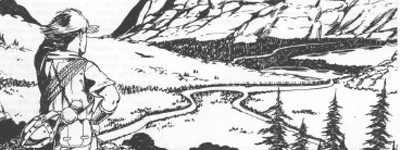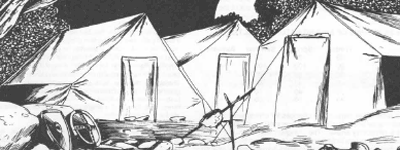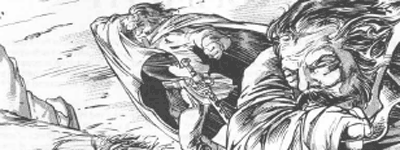

MIDDLE OF THE DAY: TRAVELLING
The overland map is divided into 5-mile squares. Each day, the party has movement points equal to the speed of the slowest member. Entering a square costs one or more movement points (see Speed Multipliers). On entering a square, the party makes a Wilderness Encounter check (see Wilderness Encounters). Speed Multipliers: Normal terrain (plains, roads): Every square costs 1 movement point. Difficult terrain (most wilderness): The first two squares of difficult terrain each day costs 2 movement points; the rest cost 1. Very difficult terrain (mountains, deep marshes): Every square costs 2 movement points. Blocking terrain (peaks): Trying to move into a square requires skill checks and ends movement for the day. Forced march: You can sacrifice a healing surge (or 1/4 max HP) to gain one movement point, up to double your movement points. You do not regain these surges from tonight's extended rest. Roll 1d20. (If the area is fully explored, do not roll.)
|
END OF THE DAY: CAMPING
In camp, there are 2 guard shifts of 3 hours each. If player stands a watch, they start the next day minus one healing surge unless they are trained in Endurance. A character who watches both shifts does not get the benefit of the extended rest. During each shift, roll 1d20. On a 1, the party has a Wandering Encounter from which they cannot run. If no guard was set for that shift, the party is surprised. BEGINNING OF THE DAY: WEATHER
Sleeping in the wilderness is not as restful as sleeping in beds. At the end of each extended rest in the wild, roll 1d20 for the weather. (Season, area and prevailing weather can impose bonuses or penalties of +5 to -5 to the die roll.)
Fatigue checklist: -Forced march yesterday? see Travelling -Stood watch last night? see Camping -Bad weather this morning? see Weather |